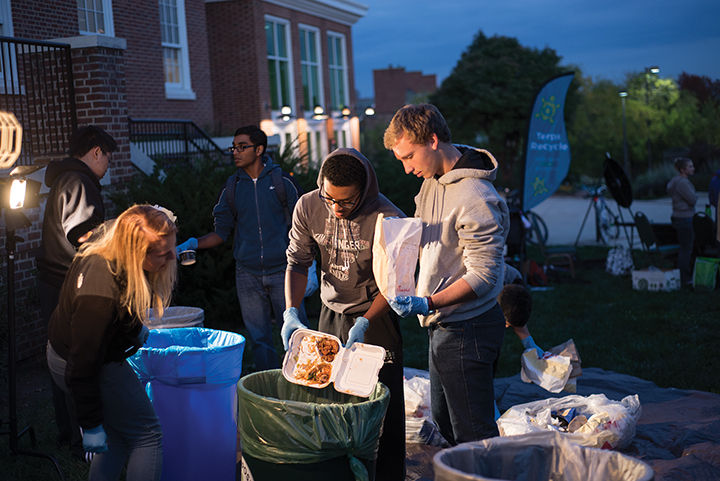
Students sorting waste from stamp into Trash, Recycling and Compost buckets.
A day’s worth of waste piled up on the grass in front of Stamp Student Union yesterday night as freshmen from the Environment, Technology and Economy Scholars program sorted through more than 25 trash bags in performing a waste audit.
The 5 p.m. event could have been mistaken for a fast-paced competition with the three staging areas and trash cans for waste disposal, but the students slowly sifted through the bags for more than an hour with direction from their program’s director, Becky Archer.
“One of the things people also think about with sustainable development is they think reduce, reuse, recycle,” Archer said. “Everyone focuses on the recycle, but the reduce and reuse are more important.”
Other than providing a hands-on and somewhat dirty experience for the first-semester students, it also provided an example of what happens in waste management facilities every day for the students and passersby, Archer said.
Currently, this university pays $52 to dispose of a ton of trash, $25 for compostable waste and $5 for recycling, determined by the contract Facilities Management’s recycling and solid waste unit has with this university, said Adrienne Small, Facilities Management recycling specialist.
The cost of disposing compostable waste is down from $67 per ton last year.
After the students finished sorting the waste into three separate bins, they weighed the amounts to see how much people recycle, compost and throw away on a regular day at Stamp.
“Sometimes we don’t release the numbers that we get from this [audit] because they are not as great as people would want to see,” said Morgan Bachman, Facilities Management’s recycling program associate. “We don’t want people to give up on recycling just because of that.”
However, a more positive Campus Sustainability Progress Report, released in early October, stated that this university achieved a 78 percent recycling rate in 2013, compared with area universities such as George Washington University, which reported a rate of 29 percent.
The audit is one of many different ways Facilities Management gathers data to see the progress of the department’s outreach recycling programs in dining facilities on the campus, said Dan Wray, the assistant director of facilities at Stamp.
“We use this to see how well we are doing in our outreach campaign to educate our students and guests to the food court how to properly sort their trays,” Wray said.
The audits first started as an Office of Sustainability outreach activity but have now expanded to include the LEAF Outreach Team, Terps Recycle, Dining Services, Facilities Management and many other departments, said Andrew Muir, Office of Sustainability spokesman.
“This is one of the many activities [this scholars program] does, and I suppose it represents the ongoing improvement of the status of UMD as a sustainable university,” said Paul Relph, a freshman mechanical engineering major who participated in the audit.
The scholars program plans to perform another waste audit at Byrd Stadium on Nov. 16, the day after the football game against Michigan State, Relph said.



